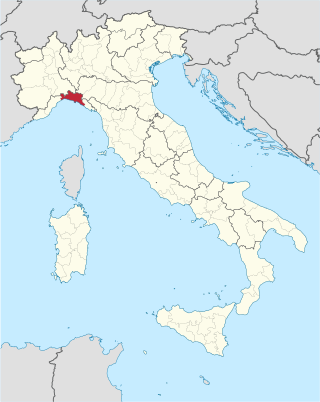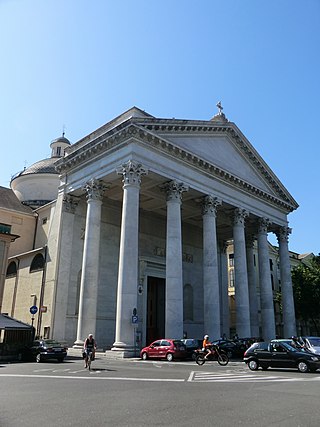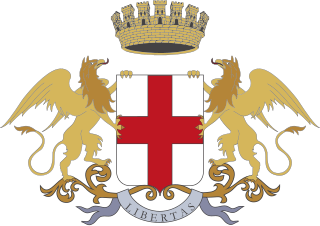
Pope Adrian V, born Ottobuono de' Fieschi, was the head of the Catholic Church and ruler of the Papal States from 11 July 1276 to his death on 18 August 1276. He was an envoy of Pope Clement IV sent to England in May 1265 who successfully completed his task of resolving disputes between King Henry III of England and his barons. Adrian V was elected pope following the death of Innocent V, but died of natural illness before being ordained to the priesthood.

Pope Innocent IV, born Sinibaldo Fieschi, was head of the Catholic Church and ruler of the Papal States from 25 June 1243 to his death in 1254.

The Republic of Genoa was a medieval and early modern maritime republic from the years 1099 to 1797 in Liguria on the northwestern Italian coast. During the Late Middle Ages, it was a major commercial power in both the Mediterranean Sea and the Black Sea. Between the 16th and 17th centuries, it was one of the major financial centers in Europe.

The Province of Genoa was a province in the Liguria region of Italy. Its capital was the city of Genoa. It was replaced by Metropolitan City of Genoa.

The Archdiocese of Genoa is a Latin Church ecclesiastical territory or diocese of the Catholic Church in Italy. Erected in the 3rd century, it was elevated to an archdiocese on 20 March 1133. The archdiocese of Genoa was, in 1986, united with the Diocese of Bobbio-San Colombano, forming the Archdiocese of Genoa-Bobbio; however a split in 1989 renamed it the "Archdiocese of Genoa."

The nobility of Italy comprised individuals and their families of the Italian Peninsula, and the islands linked with it, recognized by the sovereigns of the Italian city-states since the Middle Ages, and by the kings of Italy after the unification of the region into a single state, the Kingdom of Italy.

Belmonte Calabro, known simply as Belmonte prior to the proclamation of the Kingdom of Italy, is a town and comune in the province of Cosenza, in Calabria. The town is perched on a hilltop on the coast of the Tyrrhenian Sea.

Giovanni Luigi Fieschi or Fiesco was a Genoese nobleman, count of Lavagna. He is the subject of the play Fiesco by Friedrich Schiller.

Chiavari is a seaside comune (municipality) in the Metropolitan City of Genoa, in Italy. It has about 28,000 inhabitants. It has a beachside promenade and a marina and is situated near the river Entella.

Lavagna is a comune (municipality) in the Metropolitan City of Genoa, in the Italian region of Liguria.

Prince of Belmonte is a noble title created in 1619 by the Spanish crown for the Barons of Badolato and Belmonte. The name of the title is taken from the fortress town of Belmonte in Calabria, historically important for the defence of the Italian coast from Saracen invasion. Belmonte has been known since the Risorgimento as Belmonte Calabro.

Marquess or Marchioness of Galatone was a noble title created by the Kings of Spain for Stefano Squarciafico, Patrician of Genoa, on 29 June 1562, and inherited according to Spanish nobiliary law. The title is currently held by the Prince or Princess Belmonte.
Orazio Giovan Battista Ravaschieri Fieschi was a wealthy nobleman and patrician ('patrizio') of Genoa descending from the Fieschi, Counts Palatine of Lavagna, in what is now Liguria. He was appointed Grand Seneschal of Naples, and, on 5 March 1619, he was elevated to the title of Prince of Belmonte at Madrid by Philip III of Spain. Orazio descended from a line of imperial and royal bankers, his great-grandfather Giovan Battista and grandfather having been Treasurers to Charles V, Holy Roman Emperor, and King Philip II of Spain respectively.

The Diocese of Chiavari is a Latin diocese of the Catholic Church in Liguria, northern Italy. It was created on 3 December 1892 by Pope Leo XIII in the Bull Romani Pontifices. It is a suffragan of the Archdiocese of Genoa.

Fiesco is the second full-length drama written by the German playwright Friedrich Schiller. It is a republican tragedy based on the historical conspiracy of Giovanni Luigi Fieschi against Andrea Doria in Genoa in 1547. Schiller began it after the 1782 premiere of his first play, The Robbers, and dedicated it to his teacher Jakob Friedrich von Abel. It has 75 scenes, which is more than Goethe's highly popular Götz von Berlichingen. It premiered in Bonn in 1783 at the Hoftheater.
Count Sesto is the title borne by the current head of the existing noble family of that name, of ancient Genoese and subsequently Sicilian origin.

Nicolò Guarco was a Genoese statesman who became the 7th doge of the Republic of Genoa and led the Republic through the War of Chioggia against Venice.
Opizzo Fieschi, also known as Opizo or Opiso dei' Fieschi, was a 13th-century Italian cleric from the powerful Genovese Fieschi family. Following his uncle Sinibaldo's election as Pope Innocent IV, Opizzo was appointed the Catholic Church's patriarch of Antioch.
Alagia Fieschi, also known as Alagia di Nicolò Fieschi and Alagia di Fieschi, was the daughter of Count Nicolò Fieschi and niece of Pope Adrian V. Alagia married Moroello Malaspina in the 1280s and they had five children. In Dante Alighieri's Divine Comedy, Alagia is remembered by Adrian V at the end of his conversation with Dante as the only virtuous woman in his family whom he wishes to pray on his behalf. Alagia’s mention as the only virtuous person in her family reflects Dante’s view about Alagia's family's actions involving the Malaspina family. In addition, Alagia is celebrated by Dante through his portrayal of her as a virtuous woman whose prayer can contribute to Adrian V's journey of salvation.















